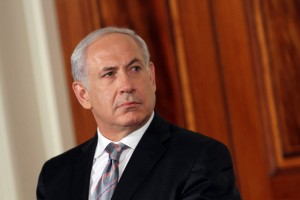
(AFP Photo)
Provisional election results in Israel show that current Prime Minister Benjamin Netanyahu’s Likud Party won 30 of the 120 seats in the Israeli Parliament. With 99% of the votes counted, Netanyahu’s Likud Party have come out ahead of the Zionist Union Party of Isaac Herzog and Tzipi Livni which won 24, and the Joint Arab List which acquired 14 seats.
According to Israeli newspaper Haaretz, President Reuven Rivlin said Tuesday evening that he was convinced only a “unity government can prevent the rapid disintegration of Israel’s democracy […].”
Rivlin is likely to task Netanyahu with the formation of a new government, possibly depending on the endorsement of the mid-right Kulanu Party.
Speaking to right-wing website NRG Monday, Netanyahu stated there will be no Palestinian state if he is re-elected, marking a new level in his shift to the right prior to the elections.
The Palestinian Ministry of Information issued a paper on election day saying that “candidates are running on the incitement against the Palestinians and transmitting the ideas of racism […]”.
Chief Palestinian negotiator Saeb Erekat also stated after the initial announcement of results on Tuesday that Palestine will push to go to “the Hague Tribunal”. The Palestinians are pushing for an investigation into potential Israeli war crimes since Netanyahu is likely to head the new Israeli government, according to a report by AFP news agency.
Furthermore, according to German news agency dpa, Hamas official Ismail Radwan said Tuesday, concerning Palestinian negotiations, that this should “convince the Palestinian Authority and Fatah Party to forget about […] the absurd negotiations”.
Israeli political analyst Meir Cohen told Daily News Egypt that the most likely option for a coalition will be a right-wing based one under Netanyahu. There will also be some kind of involvement of the more moderate Kulanu Party, which is purportedly more interested in the status of the lower classes and some kind of peace process then Likud.
Concerning the Palestinian issue, Cohen said that peace talks “can be taken against him [Netanyahu]” and decrease his popularity. Netanyahu’s comments on the Palestinian state directly prior to the elections are not to be taken seriously, Cohen said, but were simply a move to attract right-wing voters.
The Prime Minister himself shifted in his victory speech on early Wednesday slightly away from his strong right-wing statements prior to the election, addressing “Jews and non-Jews alike” with “you are all important to me,” but simultaneously calling upon the “nationalist party leader” to join him in the formation of a government “without delay”.
Meanwhile, Zionist Union leaders admitted their defeat, though it is still unclear whether they will try to broker a coalition with Kulanu and other moderate and left-wing parties or just take the opposition role.

